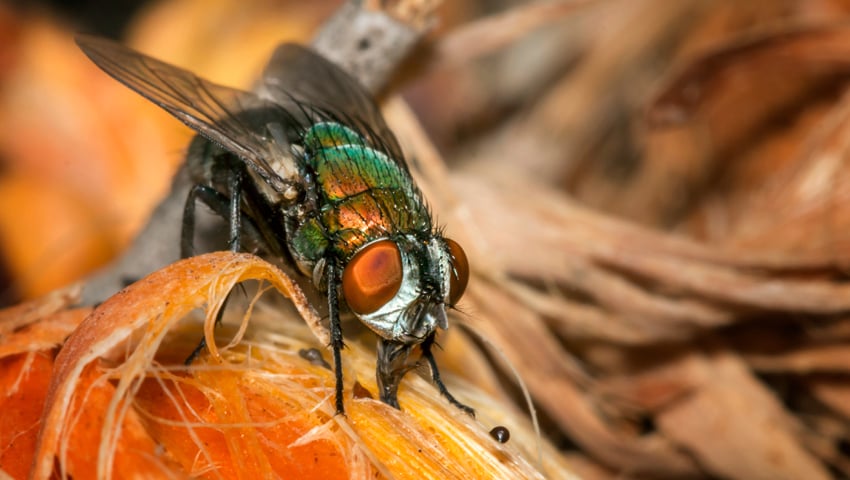FERA Science has invested £1m into creating a UK ‘first of its kind’ insect research laboratory at York Biotech Campus (YBC).
This will see the conversion of a former storage unit on site into a purpose-built insect research unit and will see the business’s presence at YBC grow by over 2,000 square feet.
The laboratory, which is also one of the first in Europe, will allow Fera to upscale its current insect services and help meet the needs of clients from across the food industry by being able to show insect bioconversion at scale and replicate the nature of insect farming in a factory.
Insect bioconversion is the process of feeding insects waste to create additional materials, such as protein or fertiliser, and is a hugely sustainable practice that reduces waste, provides alternative food for animal feed and reduces the environmental impact of sourcing for protein in already depleted areas, ultimately helping to combat climate change.
Services that Fera will be able to offer its clients include advising how companies can benefit from insect bioconversion to demonstrate their commitment to sustainability, as waste that usually ends in landfills can be used to benefit the circular economy instead, as well as using their waste to create an additional revenue stream.
The laboratory will not only support Fera’s clients, but will also enable collaborations with university partners, start-ups, insect farms and support policy and regulatory authorities within the Department for Environment, Food and Rural Affairs (Defra).
Work on the unit started on site this month, with operational launch of the laboratory set for July 2022.
In line with the launch of the new laboratory, Fera will also be expanding its team and is looking to recruit six team members across the coming months.
Damian Malins, Venturing Projects Director at Fera Science said “We’re extremely excited about opening our new insect research laboratory, as it means we’re able to deliver far more to all our clients including commercial and public sector, as well as research partners.
“What’s even better is that we’re growing our base at YBC. The campus sits at the heart of an agricultural region that is driving the circular economy and bio-based industry. The collaboration it encourages is fantastic, and through connections with other tenants and near neighbours we have already established links to food producers, community groups and agri-businesses who wish to explore the potential of insect farming as part of their net carbon zero objectives.”
Liz Cashon, Innovation Campus Manager at York Biotech Campus added “We’re so pleased to have been part of supporting the design and build of this new laboratory for Fera, having worked together since it was simply a concept. We always aim to help our occupiers achieve their commercial ambitions, so it’s very rewarding for us that the laboratory will help Fera service more clients and establish additional partners.
“It’s an extremely exciting laboratory to have on site and further cements the campus as playing a major role in driving forwards research and innovation in the region, as well as helping to make the world a more sustainable place to live for future generations.”
Fera Science is also collaborating in early-stage research with Yorkshire Water to explore and test the feasibility of using insect bioconversion to manage sewage sludge.
Richard Kershaw, Wastewater Innovation Programme Manager, Yorkshire Water said “Yorkshire Water is committed to exploring innovative approaches to dealing with the most challenging aspects of waste water management, including sewage sludge. The science of insects and their ability via bioconversion to manage a variety of challenging waste streams safely and effectively is building exponentially. Hence our interest in and commitment to funding preliminary work with Fera using black soldier fly larvae on sewage sludge.”
Yorkshire Water have agreed a three-month preliminary research programme managed by Fera. Four samples of sewage sludge from different geographical locations and type of wastewater treatment plant will be examined to determine the ability of these samples to support insect development.
Dr Maureen Wakefield, Principal Scientist Entomology at Fera is leading the research for Yorkshire Water: “The research project for Yorkshire Water is, by design, limited in scope but has the potential to point the way forwards to larger scale research programmes that may support companies in managing complex waste water streams, including sewage sludge, utilising insects.”
Fera Science has plans to bring further innovative technology to the site and the region under the BioYorkshire initiative. Working alongside the University of York and Askham Bryan College, proposals include establishing two new facilities including the research cube, a highly automated control environment supporting Fera’s work into plant and insect farming research, as well as a packaging hub.
